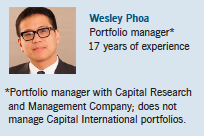Capital International Perspectives
Understanding Recent Market Developments
 Fixed-income portfolio manager Wesley Phoa shares his insights on the implications of recent market developments, including the downgrade of U.S. debt and the ongoing European sovereign debt crisis. Wesley is based in Capital’s Los Angeles office and manages portfolios for U.S. investors. He is also an investment analyst covering U.S. government bonds and has responsibilities for fixedincome quantitative research. He received a PhD in pure mathematics from Trinity College at the University of Cambridge.
Fixed-income portfolio manager Wesley Phoa shares his insights on the implications of recent market developments, including the downgrade of U.S. debt and the ongoing European sovereign debt crisis. Wesley is based in Capital’s Los Angeles office and manages portfolios for U.S. investors. He is also an investment analyst covering U.S. government bonds and has responsibilities for fixedincome quantitative research. He received a PhD in pure mathematics from Trinity College at the University of Cambridge.
by Capital International Asset Management
What does Standard & Poor’s downgrade of U.S. debt really mean for bond investors?
The impact of the rating action has been muted. Demand for Treasuries is still very strong. Investors did not stop buying Treasuries, and bank and insurance company regulators have said that the downgrade is not going to affect their treatment of U.S. Treasury bonds or other government-related securities. In essence, this downgrade will mainly affect sentiment. It should be a wake-up call for politicians and motivate them to make some constructive reforms — if so, it could actually have a positive impact in the long term.
The debt dynamics of the U.S. have been deteriorating for over a decade due to a range of government policies. However, things got dramatically worse during the last recession in 2008–09 because federal tax revenues fell sharply and there was a significant fiscal response in the form of increased government spending and tax credits. So there is a genuine long-term debt problem in the U.S. But the key point is that the economy is not broken. It is not too late to fix those problems as long as we implement sound policies.
What does this downgrade mean for Treasuries in the long run?
Even after the downgrade to AA+, U.S. Treasuries remain a large, distinct asset class that is among the most highly rated and most liquid in the world. Moreover, the investor base for Treasuries remains well diversified. Treasuries are owned by central banks, private investors, mutual funds, insurance companies and other banks throughout the world. These investors want an asset that is relatively safe from default and is universally recognized as a sound and highly liquid investment.
In addition, the U.S. dollar is the global reserve currency and it does not seem likely to be displaced from that role any time soon. If you want to keep your money in the world’s reserve currency, you would likely want to keep it in the safest asset of that currency.
Foreign central banks are the largest holders of Treasuries. They have been net buyers as they try to contain the appreciation of their own currencies by selling local financial instruments and buying U.S. dollar–denominated assets with the proceeds. While they may diversify their holdings in the long term, they are likely to continue buying Treasuries in the near term. In the last week of July, when the potential for a U.S. debt downgrade was known in the markets, the Treasury auctioned two-, five- and sevenyear notes totaling $99 billion. Foreign central banks bought 35% of these bonds compared to 30% in June.
Does the U.S. credit rating downgrade in fact diminish the reserve currency status of the dollar?
A one-notch credit rating downgrade from AAA to AA+ does not change the status of U.S. Treasuries as safe, liquid assets in the reserve currency of choice. This could be the case even if the other two main rating agencies, Fitch and Moody’s, follow S&P’s lead and cut their ratings for the U.S.
While I don’t think it is a good thing to have a global system that relies solely on U.S. dollars and U.S. Treasuries — it has not imposed a good discipline on the United States — I don’t see any sudden shift away from the current status of U.S. Treasuries or the dollar.
Is this 2008–09 all over again? What’s changed and what hasn’t?
We are in the middle of a very big debt hangover that is going to take several years to recover from. Some companies are going to prosper a lot in this environment, but I don’t think that developed markets will see a rising tide as in some previous economic expansions. In my view, the big developed markets will continue to struggle even as the developing economies continue to expand at a fast pace. It will be even more important than it has been in some of the past expansions to invest in companies that have the greatest potential to prosper, and to pick enough of them so that investors have a diversified portfolio that will hold up under different scenarios.
We are also seeing a lot of unexpected connections between different markets. These linkages are becoming more important and more complicated. Investors need to take a holistic view of markets. At Capital we have spent a lot of time in the past couple of years building better connections, finding more ways for our equity, fixed-income, money market, and macro analysts to work together. I think that as the market keeps evolving we will keep developing even more ways for our investment professionals to collaborate.
In what ways will the move affect sentiment in a market already unnerved by the debt crisis gripping Europe?
There is little doubt in my mind that recent events will bring about more market volatility. There is a very intense focus on political risk and policy risk, which are inherently difficult to predict. We are also seeing pressure on the banking system in Europe, which in itself creates financial market volatility because those institutions play such a big role in the markets. This has been a pretty fragile economic recovery and expansion, primarily because recoveries from financial crises tend to be more tenuous.
Furthermore, a big problem with a fragile recovery is that it is quite vulnerable to bad luck and policy mistakes — and we’ve had to deal with a lot of both this year, ranging from the oil supply shock in Libya, supply chain disruptions after the earthquake and tsunami in Japan, and the lack of strong, effective political leadership in both the U.S. and Europe. In Europe, there has clearly been a lot of uncertainty over how the sovereign debt crisis has been playing out, and it is very important for investors not to fixate on a single scenario.
There are several different potential outcomes to the European sovereign debt crisis. As portfolio managers, we need to be prepared for various scenarios, or at least have clear ideas on how to respond as things unfold.
Is there anything more U.S. policymakers, and the Fed in particular, can do to underpin the economy?
As we’ve seen, there is a big difference between what policymakers can do and what they will do. They can, in theory, still do a lot. The Fed has in recent days made a conditional commitment to keeping interest rates extremely low for an extended period, to 2013. To give a specific time frame and say that rates will be exceptionally low until the middle of 2013 — that is a big step for the Fed. It is new and it was probably a tough action for the central bank to take. However, this is not an unconditional commitment. It is not a promise to keep rates low under any circumstances. It is based on how the Fed expects the economy to evolve.
Among other steps, the central bank could also make a commitment to keeping the balance sheet large for a long time. It could even expand it some more by resuming large-scale asset purchases, as it did last year. Or it could extend the maturity of its Treasury holdings. The underlying message from the Fed is that it is paying attention to the U.S. economy and that it takes its dual mandate — that of delivering both price stability and full employment — very seriously. The Fed understands that the labour market is very weak and that monetary policy needs to continue to be supportive.
Still, it is not the Fed or fiscal policy that is going to get the U.S. out of an economic slowdown. It is households and businesses going out and spending and investing. As investors, we spend more time focusing on these trends and less on what the Fed is doing.
What should policymakers in the euro zone do?
First, and probably most urgently, policymakers need to stabilize the European banking system and improve the banks’ funding situation. They need to find ways to give more explicit protection to the banking system and to depositors, which is one of the things they have struggled to do so far. There are other actions policymakers can take, but those will probably occur over a longer time frame.
Investors also want a clearer picture from policymakers of who will bear the cost of bank refinancing and whether equity stakeholders will have to suffer dilution of their existing shares through capital raisings or if subordinated bondholders will have to take losses on their investments. A key step in Europe will be resolving those uncertainties. Everything does not need to be done at once, but there does need to be a plan for the next few years, not just a series of interim support measures that tide things over for a couple months.
A very important part of making sure this process works is building political support from voters in different countries. The problem is that the market wants these things to happen far more quickly than the political environment can allow them to happen in Europe.
How are investment professionals getting a clearer sense of the risks and opportunities in Europe?
We are thinking through a number of different scenarios. Some of them look at the potential impact of controlled government debt restructurings in the peripheral euro zone economies. Others factor in more aggressive intervention by the European Central Bank, which would probably imply a big devaluation of the euro. There is also the possibility of more coordinated action from the G20 group of nations, which could help stabilize markets. The worst-case scenario, which in my opinion has a very low probability of occurring, could see the breakup of the euro zone, which in the near term would impose very significant economic costs on the most debt-burdened nations.
We’re thinking all of these things through. The important thing to remember is that there are enough potential benign outcomes. If policymakers become very focused in Europe — and the market is forcing them to do just that — then I think we could see a positive resolution, although it is going to be a very bumpy ride because this will take some time.
Aside from the prospect of better policymaking, what else do investors have to be encouraged about?
Unlike in 2008, many companies have exceptionally strong balance sheets and very little organizational fat. They are operating very efficiently and have highly focused managements who understand how important it is to make sure that their companies are positioned not just to grow earnings but also to survive through different potential economic scenarios. So there really is no reason why even another round of bad luck should push us into a recession. But the most important investment theme continues to be the strong, secular growth of the developing economies — not just China, but a range of countries such as India, Brazil and Indonesia that are in a multi-decade process of growing and improving their living standards.
Although we will probably see exaggerated business cycles in these areas, we should not get distracted by those cyclical fluctuations. The broader secular picture in the developing world is highly positive, which is one of the things that will help the developed world recover and get the U.S., Europe, and even Japan through the problems of today.
How do you and other fixed-income portfolio managers think about mitigating risk in this volatile market environment?
We try to have a good combination of assets — government bonds, corporate bonds, a mix of currencies, a mix of different credits — so our portfolios are robust in the face of volatility. In the most recent period, we have seen a decline in the price of some corporate bonds issued by financial institutions while at the same time U.S. and German government bonds have rallied. As markets recover, we may see a recovery in financial credits. Hence, maintaining well-diversified portfolios is the best approach in my view.
For more information, visit: http://capitalinternational.ca
Copyright © Capital International Asset Management
Commissions, trailing commissions, management fees and expenses all may be associated with mutual fund investments. Please read the prospectus before investing. Mutual funds are not guaranteed, their values change frequently and past performance may not be repeated. Wesley Phoa does not directly manage Capital International portfolios.
The information contained in this document is for your informational purposes only and is not intended to provide any tax, legal or financial advice. The Capital International portfolios are available through registered dealers. For more information, please consult your financial and tax advisors for your individual situation. The statements expressed herein are informed opinions, speak only to the stated period, and are subject to change at any time based on market or other conditions. Additionally, in the multiple portfolio counselor system, differences of opinion are common, and the opinions expressed by an individual do not necessarily reflect the consensus of the team. Forward-looking statements are not guarantees of future performance, and actual events and results could differ materially from those expressed or implied in any forward-looking statements made herein.
Capital International Asset Management (Canada), Inc. or its affiliates assume no liability for any inaccurate, delayed or incomplete information, nor for any actions taken in reliance thereon. The information contained about each product or firm, as the case may be, has been supplied without verification by us and may be subject to change. Capital International Asset Management (Canada), Inc. is part of The Capital Group Companies, Inc., a global investment management firm originated in 1931. The Capital Group Companies, Inc. includes two of the world’s largest providers of global/international equity investment services: Capital Research and Management Company (U.S. mutual funds) and Capital Group International, Inc. (global institutional), which also includes Capital Guardian Trust Company. Our funds are subadvised by our affiliates, Capital Research and Management Company and Capital Guardian Trust Company. These groups manage equity assets independently from one another.










